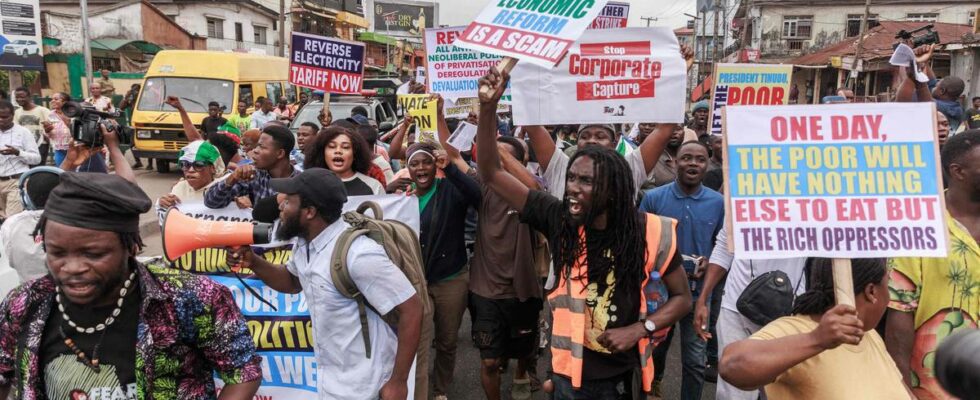The case in brief Thousands of young people have demonstrated in Nigeria in recent days due to dissatisfaction with economic reforms and the high cost of living. They are inspired by the youth protests in Kenya in the past. At least seven people have been killed and over 700 have been arrested, including 50 journalists. The protests are triggered by an increasing economic crisis, a desire for better democracy and an end to widespread corruption. President Bola Tinubu’s reforms with the removal of subsidies on fuel and the end of tying the local currency to the dollar have led to increased fuel prices and weakened the currency. The protesters organize themselves on social media under the hashtag “#EndBadGovernance”. The governing authorities have responded with curfews, tear gas, shots from the police and threats of military intervention. The summary is made by an AI service from OpenAi. The content is quality assured by news’s journalists before publication. In recent days, several thousand young people have taken to the streets in Nigeria. Nigerians are dissatisfied with the increasingly high cost of living due to economic reforms that President Bola Tinubu has seen in progress after he came to power in 2023. The protesters have been met with tear gas and live ammunition. At least seven people have been killed and more than 700 have been arrested in the last three days, according to the BBC. At least 50 of those arrested are journalists. A protester lies on the ground looking at his injuries after clashes with Nigerian security forces during the End Bad Governance protest in the capital Abuja. Photo: KOLA SULAIMON / AFP – The protests are triggered by an increasing economic crisis. They are about getting a better democracy and putting an end to extensive corruption, says Nigeria expert Camilla Houeland. Nigeria is the most populous country in Africa with approximately 218 million inhabitants and is the fourth largest oil producer on the continent. High cost of living Tinubu has, among other things, removed the subsidy on fuel and stopped tying the local currency to the dollar. According to Houeland, this has led to the country’s currency losing much of its value. Nigerian President Bola Tinubu. Photo: FAYEZ NURELDINE / AFP The price of fuel has increased, as has the price of food, which has increased by over 40 percent since last year. – People in Nigeria are tired, frustrated and angry. They are old men who hoard resources and power. They are tired of getting little use out of the country’s enormous natural resources, says Houeland at Fafo. Protesters gather during the End Bad Governance protest in Lagos. Photo: BENSON IBEABUCHI / AFP She has researched protests, trade unions in Nigeria and how oil affects the country’s economy. The increased prices have not gone down well with the population. Already in June, they protested in the capital, Abuja, and the largest city, Lagos. “#EndBadGovernance” In recent days, the demonstrations have flared up again after the protests in Kenya. There, young people organized themselves on social media and managed to force the government to scrap plans to increase taxes. On Monday, the demonstrations calmed down with only hundreds in the streets. Houeland says she thinks there will most likely be new protests. The protesters organize themselves through social media under the hashtag “#EndBadGovernance”. – They are inspired by the demonstrations in Kenya. Nigerians are frustrated and angry at the state, which does not take care of them, and are fed up with poor distribution of resources and corruption. Protesters hold a placard as they gather behind barbed wire during the End Bad Governance protest in Abuja. Photo: KOLA SULAIMON / AFP According to Houeland, it is unclear who is organizing the demonstrations, but both organizations and ordinary people are behind it. Nigeria has a history of frequent riots, mainly because the people are fed up with economic inequality and limited democracy, the researcher says. – Tinubu won with 37 percent at the election in 2023. Only 29 percent of the registered voters voted. Asking the youth to stay home In a speech that was shown on local TV channels, Tinubu appeals to the people: “My dear Nigerians, especially our youth, I have heard you clearly and clearly”. He adds that he understands their pain and frustration. Tinubu has not met the demands of the protesters, but has defended the economic reforms. Nigerian police patrol the streets, in ongoing demonstrations against poor governance and economic hardship, in Lagos, Nigeria. Photo: Francis Kokoroko / Reuters The governing authorities have introduced curfews in several northern states. – Curfews, tear gas and shots from the police, as well as threats of military intervention are not democratic reactions, says Houeland about how the protesters have been met. Amnesty International has asked the governing authorities in the country to implement measures to protect the human rights of the protesters. Deputy Speaker of the House of Representatives Bejamin Kalu has proposed halving his salary. Nigeria has some of the world’s best-paid parliamentarians, according to The Guardian. People protest in the streets of Kano, Nigeria. Photo: Sani Malkatanga / AP The opposition has criticized the handling of the protests. Several in the government have blamed the opposition for being behind the protests to undermine the government. When asked if the protests are being orchestrated by the opposition, Houeland says that they are real protests, driven by ordinary people. Published 06.08.2024, at 07.28 Updated 06.08.2024, at 07.47
ttn-69
Thousands of young people protest against high living costs – news Urix – Foreign news and documentaries

